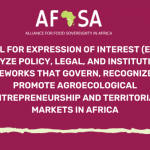CIVIL SOCIETY DECLARATION ON AFRICAN CONTINENTAL SEED HARMONISATION
WE, delegates from 23 African countries[1] consisting of farmers, academics, CSOs, NGOs, media, faith-based organisations, agronomists, environmental lawyers and human rights defenders meeting in Dakar, Senegal, from 01 to 03 June 2022 at a pan-African Seed Conference to analyse seed governance in Africa:
RECOGNISING a global tendency towards the affirmation of intellectual property rights over biological diversity and the need to protect Africa’s resources.
KEEPING IN MIND that in Africa, most countries are now proposing seed policies and regulatory frameworks complying with existing international conventions and treaties such as the Organisation for Economic Co-operation and Development (OECD), International Seed Testing Association (ISTA), International Union for the Protection of New Varieties of Plants (UPOV), and International Plant Protection Convention (IPPC) protocols.
AWARE that processes have been established in the Regional Economic Communities (RECs) to harmonise countries’ approaches through a common dynamic involving the RECs, leading to a continental alignment of seed regulatory policy frameworks to facilitate cross border trade under the Continental Free Trade Area.
OBSERVING that the African Union has designed guidelines for “its member states to develop/revise their seed policies and legal frameworks to improve their seed sector operations and facilitate cross-border movement and trade of seeds in Africa.”
INSPIRED by cross-learning from country experiences and case studies shared by delegates from different countries, premised on quality and diversity management, meeting food, nutritional and cultural needs, strengthening productivity, climate adaptation, and diverse ecosystems, the delegates reinforced their belief in the capacity of farmer-managed seed systems to truly contribute to the food and nutritional sovereignty of the people of the African continent. Participants also reviewed various instruments related to plant genetic resources management in the world, including the Continental Guidelines for the Harmonisation of Regulatory Frameworks for Seeds in Africa (AUC/DREA/C/036), the ITPGRFA, UNDROP, the EU Organic Regulation 2018/848 concerning seed marketing, and the Indian Plant Variety and Farmers’ Rights legislation.
ALARMED by the posture of the African Union Commission tilted in support of seed quality certification, registration and industrial seed protection mirrored through imperialistic frameworks which feature the hallmarks of corporate seed trade interests contrary to rights-based approaches and tenets of freedoms and liberties conferred by the United Nations Declaration on the Rights of Peasants and Other People Working in Rural Areas.
CONCERNED for the future of millions whose livelihoods are closely linked to African agriculture, which relies heavily on family farms and peasant seed systems, the pillars of food and nutritional sovereignty in Africa.
WE HEREBY CALL ON THE AFRICAN UNION AND ITS MEMBER STATES TO:
- Ensure that seed processes on the continent are driven in parallel by peasant collectives, not by the seed industry. Any process to establish peasant seed systems must ensure the full realisation of peasants’ rights as human rights and provide adequate geographical representation of peasant organisations from across the continent from the outset and at all stages of decision-making processes.
- Ensure that processes related to the future of the continent’s seed and food systems be subject to full democratic procedures in which interest groups (including local communities, peasants, farmers, and consumers) participate effectively and fully, in accordance with the relevant provisions of international conventions.
- Improve the continental guidelines for the harmonisation of seed regulatory frameworks in Africa (AUC/DREA/C/036), drawing on seed regulatory frameworks proposed by African Civil Society Organisations to better meet the requirements of international instruments in favour of farmers’ rights and the promotion of biodiversity.
- Apply the precautionary principle adopted by the Convention on Biological Diversity and ratified by all African Union Member States and implement a ban on GMOs on the continent.
AND WE COMMIT OURSELVES, DELEGATES FROM 23 COUNTRIES PRESENT IN DAKAR, TO:
- Sharing our analysis of the Continental guidelines for the harmonisation of seed regulatory frameworks in Africa (AUC/DREA/C/036) in our respective countries and RECs to inform farmers’ organisations and other stakeholders on the issue.
- Promoting, at all levels and with all stakeholders, alternative regulatory frameworks for seed governance that support farmer-managed seed systems, farmers’ seed rights and biodiversity, as a sui generis option for protecting African genetic resources.
- Using all means to prevent the ‘seeds of plenty’ from becoming ‘seeds of doom’.
- Denouncing biopiracy and using all means to ensure that farmers’ rights to seeds are respected in every country on the continent.
- Supporting the revision of national seed laws and policies to promote farmer-managed seed systems (FMSS).
SIGNED BY:
- 3AO/ROPPA: Alliance pour l’Agroécologie en Afrique de l’Ouest / Réseau des organisations paysannes et de producteurs de l’Afrique de l’Ouest
- ABN: African Biodiversity Network
- Action Aid
- ADAK: Association des Agriculteurs de la Région de Kaolack
- AREJ: Action Réelle sur l’Environnement, l’enfance et la Jeunesse
- ASPSP: Association Sénégalaise des Producteurs de Semences paysannes
- ATP: Association Tunisienne de Permaculture
- BIBA Kenya: Biodiversity and Biosafety Association of Kenya
- Caritas Kaolack
- CERAAS: Centre d’étude régional pour l’amélioration de l’adaptation à la sécheresse
- CNCPRT: Conseil National de Concertation des Producteurs Ruraux du Tchad
- CNOPCAF: Concertation Nationale des Organisations Paysannes de Centrafrique
- COASP: Comité Ouest Africain des Semences Paysannes
- Commons for EcoJustice
- Commune de Koussanar
- Commune de Ndramé Escale
- Commune de Saré Coly Sallé
- COPAGEN: Coalition pour la protection du patrimoine génétique africain
- DPF: Dynamique Paysanne Féminine
- ESAFF: Eastern and Southern Africa Small-scale Farmers Forum
- Fahamu Africa
- FONGS: Fédération des Organisations Non-Gouvernementales du Sénégal FONGS- Action paysanne
- FoodBank Botswana
- GPA: Growth Partners Africa
- Haki na Wiri Afrika
- INADES Formation: Institut Africain pour le développement économique et social
- IRPAD Afrique : Institut de Recherche et de Promotion des Alternatives en Développement
- ITRAD : Institut Tchadien de Recherche Agronomique pour le Développement
- NOARA: Network of Organic Agriculture Researchers in Africa
- ORAD : Organisation des Ruraux pour une Agriculture Durable
- PELUM: Participatory Ecological Land Use Management
- PELUM Zambia: Participatory Ecological Land Use Management- Zambia
- PN: Permaculture Network:
- POPKADIFA: Plateforme des Organisations Paysannes des régions de Kaolack-Kaffrine-Diourbel-Fatick
- PROPAC: Plateforme Régionales des Organisations Paysannes d’Afrique Centrale
- RAYA KARKARA
- RLS NA: Rosa Luxemburg Stiftung Northern Africa
- RLS SA: Rosa Luxemburg Stiftung Southern Africa
- RLS WA: Rosa Luxemburg Stiftung West Africa
- RNA SA: Réseau Nord-Africain pour la Souveraineté Alimentaire
- RWA: Rural Women’s Assembly
- SECAM: Symposium of Episcopal Conferences of Africa and Madagascar
- SSN: Seed Savers Network
- SWISSAID Tanzania
- SWISSAID Tchad
- TABIO: Tanzania Alliance for Biodiversity
- TIRPAA/Cameroun: Traité international sur les ressources phytogénétiques pour l’alimentation et l’agriculture
- TIRPAA/Niger: Traité international sur les ressources phytogénétiques pour l’alimentation et l’agriculture
- TIRPAA/Senegal: Traité international sur les ressources phytogénétiques pour l’alimentation et l’agriculture
- ZAAB: Zambia Alliance for Agroecology and Biodiversity
[1] Benin, Botswana, Burkina Faso, Cameroon, Central African Republic, Chad, Democratic Republic of Congo, Ethiopia, Ghana, Kenya, Malawi, Mali, Niger, Nigeria, Senegal, South Africa, Tanzania, Togo, Tunisia, Uganda, Zambia & Zimbabwe

































